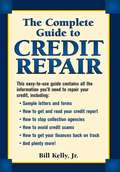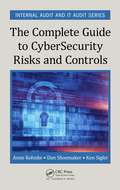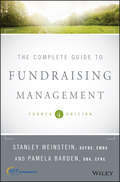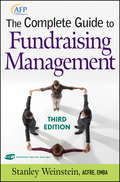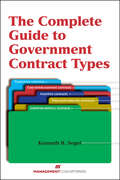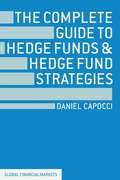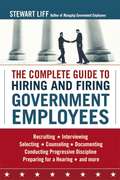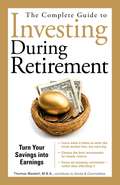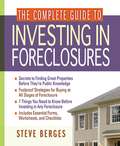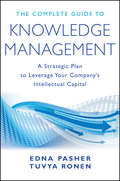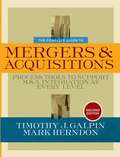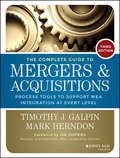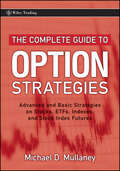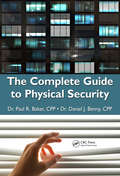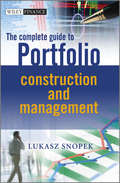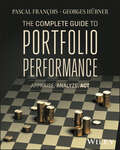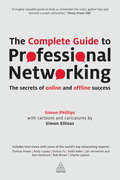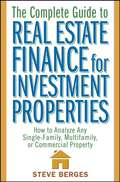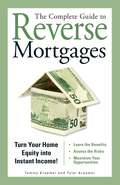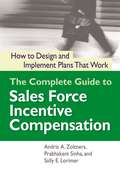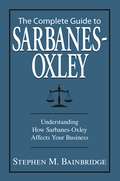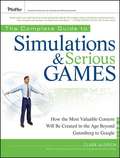- Table View
- List View
The Complete Guide to Credit Repair
by Bill Kelly Jr.The Complete Guide to Credit Repair written in a simple, straightforward tone is packed with up-to-date information on a topic that millions of people face everyday.
The Complete Guide to Cybersecurity Risks and Controls (ISSN)
by Dan Shoemaker Anne Kohnke Ken E. SiglerThe Complete Guide to Cybersecurity Risks and Controls presents the fundamental concepts of information and communication technology (ICT) governance and control. In this book, you will learn how to create a working, practical control structure that will ensure the ongoing, day-to-day trustworthiness of ICT systems and data. The book explains how to establish systematic control functions and timely reporting procedures within a standard organizational framework and how to build auditable trust into the routine assurance of ICT operations. The book is based on the belief that ICT operation is a strategic governance issue rather than a technical concern. With the exponential growth of security breaches and the increasing dependency on external business partners to achieve organizational success, the effective use of ICT governance and enterprise-wide frameworks to guide the implementation of integrated security controls are critical in order to mitigate data theft. Surprisingly, many organizations do not have formal processes or policies to protect their assets from internal or external threats. The ICT governance and control process establishes a complete and correct set of managerial and technical control behaviors that ensures reliable monitoring and control of ICT operations. The body of knowledge for doing that is explained in this text. This body of knowledge process applies to all operational aspects of ICT responsibilities ranging from upper management policy making and planning, all the way down to basic technology operation.
The Complete Guide to Fundraising Management
by Stanley Weinstein Pamela BardenThe real-world guide to successfully funding your nonprofit program The Complete Guide to Fundraising Management is the comprehensive handbook for successful fundraising, with a practical focus that applies across the nonprofit sector. With a focus on planning, self-assessment, continual improvement, and high-payoff strategies, this book provides more than just ideas—it shows you the concrete, real-world actions that make it all happen, and gives you the tools you need to bring these concepts to life. This new fourth edition features the latest information about social media campaigning, internet fundraising, crowdfunding, and more. Timelines, checklists, and forms help you streamline management tasks to focus on effective development, and updated sample reports and budget information help you begin implementing these approaches quickly. The nonprofit world is becoming increasingly competitive in terms of funding, and fundraisers are being asked to perform miracles more than ever before. This book offers a time-tested framework for fundraising success, with step-by-step guidance through the entire process from prospect to program. Understand and apply the major principles and best practices of fundraising Manage information, resources, development, and volunteers Adopt new approaches to relationship-building and prospect identification Write grants and fundraising materials that make a rock-solid case for support There is never enough funding to go around. To survive and thrive, nonprofits must revitalize interest and generate more support. Gone are the days of door-knocking and bake sales; strategy is critical, and execution must be top-notch. The Complete Guide to Fundraising Management shows you the real-world strategies that get your programs funded.
The Complete Guide to Fundraising Management
by Stanley WeinsteinThere are now more than 1 million nonprofit organizations in the United States, and the fundraising industry is one of the fastest-growing segments of the economy. The Complete Guide to Fundraising Management presents step-by-step guidance on planning, self-assessment, continual improvement, cost effective fundraising strategies and much more. An accompanying website contains checklists, grids, and sample forms. Plus, the Third Edition adds a chapter on internet fundraising as well as updated statistics. Fundraising professionals will benefit from the practical advice on managing the complexities of a development office.
The Complete Guide to Government Contract Types
by Kenneth R. SegelEverything You Need to Know About Government Contract TypesAs the world's single largest buyer of goods and services, the federal government has many ways to structure its procurements. Different situations and conditions often determine the best vehicle for a particular purchase. Contracting officers must assess a wide range of factors to determine which contract type will provide the government the best value and the least risk.The Complete Guide to Government Contract Types provides a comprehensive overview of the key government contract vehicles and types: fixed-price, cost-reimbursement, incentive, and other (which includes letter, indefinite-delivery/indefinite-quantity, and time-and-material contracts). The author first explains the selection process for contract vehicles, which is the basis for selecting the appropriate contract type for the work in question. He then presents a comprehensive, in-depth analysis of each contract type, explaining how each works best to meet certain types of requirements and conditions.This is an essential resource for both contracting officers and contractors seeking to understand and work effectively within the nuances of contract selection and compliance.
The Complete Guide to Hedge Funds and Hedge Fund Strategies
by Daniel CapocciOne-stop-guide to the hedge fund industry, investment and trading strategies adopted by hedge funds and the industry's regulation. For anyone with an interest in investing or managing funds, it presents everything practitioners need to know to understand these investment vehicles from their theoretical underpinnings, to how they work in practice.
The Complete Guide to Hiring and Firing Government Employees
by Stewart LiffNot only does government bureaucracy often make hiring a cumbersome, slow-moving process, but poor performers enjoy more protection from losing their jobs than their counterparts outside of government. With over thirty years’ experience as a federal government employee, insider Stewart Liff offers a solution to the government talent shortage--enabling government managers to cut through the red tape and take advantage of the best government employees out there. The Complete Guide to Hiring and Firing Government Employees also teaches readers the equally important skills of efficiently documenting and dealing with those who don't make the cut to ensure your team starts and stays strong. You’ll discover: how to take an anticipatory approach to recruiting; how to decide who to target, and where and how to advertise for open positions; how to screen and interview candidates; how to counsel a poor-performing employee; how to use progressive discipline; how to document a case and write a charge; how to develop internal political support; and much more. Bringing the best new people on board and weeding out the worst are both the most important and the most difficult tasks faced by any employer. For federal managers, the challenge is even greater. Filled with tried-and-true strategies, this step-by-step guide will equip you to continuously uphold, strengthen, and even grow an entire department of high achievers.
The Complete Guide to Investing During Retirement
by Thomas MaskellBuy early and diversify. " But what good is that Wall Street adage for those entering retirement with little savings? They're looking for a substantial and quick return on their money. This guide is for them. It provides retirees with the knowledge and confidence needed to join the stock market later in the game. Financial expert Thomas Maskell secures readers' investments as he introduces stock market procedures and terminology, helps retirees increase their investments to multiply their account value, ignores standard Wall Street rhetoric and trains them to become their own investment experts, and leads them on the path of short-term buying and selling success. This vital stock, investing, and trading information is delivered to readers in an accessible and understandable way. Retirees can now focus on enjoying retirement-rather than affording it. "
The Complete Guide to Investing During Retirement
by Thomas Maskell"Buy early and diversify." But what good is that Wall Street adage for those entering retirement with little savings? They're looking for a substantial and quick return on their money. This guide is for them. It provides retirees with the knowledge and confidence needed to join the stock market later in the game. Financial expert Thomas Maskell secures readers' investments as he introduces stock market procedures and terminology, helps retirees increase their investments to multiply their account value, ignores standard Wall Street rhetoric and trains them to become their own investment experts, and leads them on the path of short-term buying and selling success. This vital stock, investing, and trading information is delivered to readers in an accessible and understandable way. Retirees can now focus on enjoying retirement--rather than affording it.
The Complete Guide to Investing During Retirement: Turn Your Savings Into Earnings
by Thomas Maskell“Buy early and diversify.” But what good is that Wall Street adage for those entering retirement with little savings? They’re looking for a substantial and quick return on their money. This guide is for them. It provides retirees with the knowledge and confidence needed to join the stock market later in the game. Financial expert Thomas Maskell secures readers’ investments as he introduces stock market procedures and terminology, helps retirees increase their investments to multiply their account value, ignores standard Wall Street rhetoric and trains them to become their own investment experts, and leads them on the path of short-term buying and selling success. This vital stock, investing, and trading information is delivered to readers in an accessible and understandable way. Retirees can now focus on enjoying retirement—rather than affording it.
The Complete Guide to Investing in Foreclosures
by Steve BergesThe Complete Guide to Investing in Foreclosures is written to help you identify and take advantage of opportunities while avoiding the pitfalls.As demand for real estate has skyrocketed, so have prices. But finding affordable properties to buy and sell for profit has never been easier! Why? Because foreclosures are at an all-time high, meaning banks and other lenders have unprecedented numbers of properties they are all too eager to unload. That's your opportunity to acquire prime properties -- both residential and commercial -- at incredible value, and build a substantial real estate portfolio that should give you great returns for years to come.Real estate investment professional Steve Berges gives you:Secrets for finding great properties before they're public knowledgeFoolproof strategies for buying properties at all stages of foreclosureImportant information you need to know before investing in any foreclosurePowerful ways to take advantage of little-known alternatives like HUD, SBA, VA, and IRS properties, Fannie Mae and Freddie Mac foreclosures, pre- and post-foreclosure opportunities, and moreA full selection of value assessment tools, lead-generation strategies, and practical step-by-step processesThe 7 Caveats of Investing in ForeclosuresForeclosures may be the quickest and most reliable way to profit in real estate-but you've got to know what you're doing. Whether you're new to the game or are already experienced in buying and selling foreclosed properties, The Complete Guide to Investing in Foreclosures gives you everything you need to make smart moves at every stage of the process.
The Complete Guide to Knowledge Management
by Tuvya Ronen Edna PasherA straightforward guide to leveraging your company's intellectual capital by creating a knowledge management cultureThe Complete Guide to Knowledge Management offers managers the tools they need to create an organizational culture that improves knowledge sharing, reuse, learning, collaboration, and innovation to ensure mesurable growth. Written by internationally recognized knowledge management pioneers, it addresses all those topics in knowledge management that a manager needs to ensure organizational success.Provides plenty of real-life examples and case studiesIncludes interviews with prominent managers who have successfully implemented knowledge management structures within their organizationsOffers chapters composed of short theoretical explanations and practical methods that you can utilize, based primarily on hands-on author experienceTaking an intellectual journey into knowledge management, beginning with an understanding of the concept of intellectual capital and how to establish an appropriate culture, this book looks at the human aspects of managing knowledge workers, promoting interactions for knowledge creation and sharing.
The Complete Guide to Mergers and Acquisitions
by Timothy J. Galpin Mark HerndonMergers and acquisitions (M&A) experts Tim Galpin and Mark Herndon present an updated and expanded guide to planning and managing the M&A process. This comprehensive book is unique in providing the tools to address both the human and operational sides of integration. Based on the authors' consulting experience with numerous Fortune 500 companies, this resource will help organizations capture deal synergies more quickly and effectively. Augmenting their step-by-step advice with helpful templates, checklists, graphs and tools, Galpin and Herndon provide sound guidance for successfully integrating different processes, organizations, and cultures. The authors also address pre-deal do's and don'ts, people dynamics, common mistakes, communications strategies, and specific actions you can take to create measurable positive results throughout the integration process. The revised edition not only updates case studies and presents recent integration research, but it also adds new tools.
The Complete Guide to Mergers and Acquisitions
by Timothy J. GalpinEase the M&A process with a more effective integrationplan The Complete Guide to Mergers and Acquisitions is theultimate handbook for planning and managing post-mergerintegration. Packed full of "how to" guidance, tools, templates andresources that have been put to the test on numerous due diligenceand integration efforts around the world, The Complete Guide toMergers and Acquisitions has been the go-to guide for firmsseeking to maximize the value of their deals since the release ofthe first edition in 1999.Poor integration management virtually ensures that a merger oracquisition will fail to meet financial and strategic goals. TheComplete Guide to Mergers and Acquisitions provides theinformation that enables firms to quickly and prudently captureprojected cost and revenue synergies, and to move the combinedorganization forward. The book addresses strategic dealconsiderations, due diligence, integration management, peopledynamics and cultural integration, common integration mistakes,communications strategies, and provides actionable steps towardcreating measurable, positive results throughout the integrationprocess. The updated third edition contains new information andtools to help firms in any industry manage deals of all sizes,including:Results of The State of M&A Integration EffectivenessSurvey, 2014A new chapter on the M&A process deal stages, with anexpanded Deal Flow ModelFindings of substantial M&A research from various studiesin multiple industries and organizations, supporting the conceptspresented throughout the bookNew and revised tools and templates for due diligence,integration, and results measurement and reportingNew case examples of recent transactionsHighlighted 'Key Principles' throughout each chapterA summary of key points at the end of each chapterDiscussion questions addressing the key themes of eachchapterA 'rapid assessment' diagnostic regarding the key elements ofeach chapter, which can be completed for any organizationA revised chapter on taking your M&A game to the next level- essential requirements for building M&A capabilitiesinto a consistently successful enterprise competencyMerger and acquisition activity across the globe continues togrow, and is also playing a major role in the development ofexpanding markets. A well-managed integration effort is essentialto success, and failure means a tremendous waste in terms of timeand money, as well as the rapid destruction of shareholder value.The Complete Guide to Mergers and Acquisitions: Process Tools toSupport M&A Integration at Every Level, Third Edition is aninvaluable resource to guide firms in managing M&A integrationand maximize the value of their deals.
The Complete Guide to Option Strategies: Advanced and Basic Strategies on Stocks, ETFs, Indexes, and Stock Index Futures (Wiley Trading #356)
by M. MullaneyImportant insights into effective option strategies In The Complete Guide to Option Strategies, top-performing commodity trading advisor Michael Mullaney explains how to successfully employ a variety of option strategies, from the most risky--selling naked puts and calls--to more conservative strategies using covered positions. The author covers everything from options on stocks, exchange-traded funds, stock indexes, and stock index futures to essential information on risk management, option "Greeks," and order placement. The book provides numerous tables and graphs to benefit beginning and experienced traders. Written by a CTA who has successfully employed various options strategies to generate market-beating returns, The Complete Guide to Option Strategies will be an important addition to any trader's library. Michael D. Mullaney (Jacksonville, FL) is a high-ranking commodity trading advisor who specializes in option selling strategies.
The Complete Guide to Physical Security
by Daniel J. Benny Paul R. BakerTo adequately protect an organization, physical security must go beyond the "gates, guns, and guards" mentality that characterizes most security programs. Creating a sound security plan involves understanding not only security requirements but also the dynamics of the marketplace, employee issues, and management goals. The Complete Guide to Physica
The Complete Guide to Planned Giving: Everything You Need to Know to Compete Successfully for Major Gifts
by Debra AshtonThis handbook explains how to set up and run a planned giving program, with emphasis on receiving large contributions from individuals.
The Complete Guide to Portfolio Construction and Management
by Lukasz SnopekIn the wake of the recent financial crisis, many will agree that it is time for a fresh approach to portfolio management. The Complete Guide to Portfolio Construction and Management provides practical investment advice for building a robust, diversified portfolio.Written by a high-profile investment adviser, this book reveals a practical portfolio management framework and new approach to portfolio construction based on four key market forces: macro, fundamental, technical, and behavioural. It is an insight that takes the focus off numbers, looking instead at the role of risk and behavior in finance.As we have seen with the recent finance meltdown, traditional portfolio management techniques are flawed. Investors need to understand those flaws and learn how to incorporate risk management and behavioral finance into their asset management strategies.With a foreword by industry leader Francois-Serge L'habitant, this is your one-stop guide, with new ways for you to manage, grow and preserve your investment portfolio, even in uncertain markets.
The Complete Guide to Portfolio Performance: Appraise, Analyze, Act
by Georges Hübner Pascal FrançoisAn intuitive and effective desk reference for performance measurement in asset and wealth management In The Complete Guide to Portfolio Performance: Appraise, Analyse, Act, a team of finance professors with extended practical experience deliver a hands-on desk reference for asset and wealth managers suitable for everyday use. Intuitively organized and full of concrete examples of the real-world implementation of the concepts discussed within, the book provides a comprehensive coverage of all important portfolio performance matters across 18 chapters of actionable and clearly described content. The authors have provided relevant cross-referencing where appropriate, “Key Takeaways and Equations” sections at the end of each chapter, and pointers to additional resources for anyone interested in pursuing further research. You'll also find: Discussions of more than a hundred classical and modern performance measures organized logically and with a focus on their applications Strategies for selecting appropriate performance measures based on your situation as a manager or investor Explanations of analytical techniques (statistical approaches, attribution, fund ratings...) enabling a comprehensive use of performance-related information Applications of portfolio performance criteria in concrete investment decision-making processes Highly actionable and logically organized material that's easy to find at a moment's notice A full set of pedagogical powerpoint slides and excel worksheets with all data and formulas Perfect for investors, portfolio managers, advisors, analysts, and regulators, The Complete Guide to Portfolio Performance is also a must-read reference for students and practitioners of asset and wealth management, as well as those pursuing certification such as CFA, CIPM, CIIA, and CAIA.
The Complete Guide to Professional Networking
by Simon Ellinas Simon PhillipsNetworking is a skill that many people recognize as critically important, but which many find difficult, boring or fear-inducing - or even all three. Yet if you master the techniques that really work, networking can pay dividends. Effective networking means tapping into a team of like-minded business people willing to help each other achieve their goals. If you build, grow and nurture your business networks, you will become known for your expertise and will be better placed to win the new client, business or job when it really matters. You can network successfully in person or online and The Complete Guide to Professional Networking shows you how to use both together for the most powerful results.The techniques and suggested strategies in this book are backed up by video interviews with some of the world's most successful networking experts.
The Complete Guide to Real Estate Finance for Investment Properties
by Steve BergesThis practical, real-world guide gives investors all the tools they need to make wise decisions when weighing the value and potential of investment properties. Written for old pros as well as novice investors, this friendly, straightforward guide walks readers step by step through every stage of property analysis. Whether you're buying or selling, investing in big commercial properties or single-family rentals, you'll find expert guidance and handy resources on every aspect of real estate finance, including: * Proven, effective valuation techniques * Finance tips for all different kinds of property * How various financing strategies affect investments * Structuring financial instruments, including leverage, debt, equity, and partnerships * Measurements and ratios for investment performance, including capitalization rates and gross rent multiplier ratios * Future and present value analysis * How the appraisal process works * Primary appraisal methods-replacement cost, sales comparison, and income capitalization-and how to know which one to use * How to understand financial statements, including income, balance, and cash flow * Case studies for single-family rentals, multifamily conversions, apartment complexes, and commercial office space * A detailed glossary of important real estate terminology
The Complete Guide to Reverse Mortgages: Turn Your Home Equity into Instant Income!
by Tyler Kraemer Tammy H KraemerGet the most from your home!Until recently, there were only two main ways you could get cash from your home: sell it or borrow against it and make monthly loan repayments. Reverse mortgages offer a third way of getting money from your home. If you are a homeowner, age 62 and older, you are eligible to apply for a reverse mortgage loan that converts your home equity into a tax-free income. With The Complete Guide to Reverse Mortgages, you&’ll learn all you need to know to earn the supplemental income you need, without worrying about: • Having to sell your home • Giving up your title • Taking on a new monthly mortgage payment This invaluable guide explains everything you need to know about reverse mortgages and how to use them to your advantage. With practicing attorneys Tammy Kraemer and Tyler Kraemer leading the way, you will learn the step-by-step process to getting a reverse mortgage and making the best of your retirement!
The Complete Guide to Sales Force Incentive Compensation: How to Design and Implement Plans That Work
by Prabhakant Sinha Andris Zoltners Sally LorimerA well-designed and implemented incentive program is an essential tool for building a motivated, highly effective sales force that delivers the results you need.Incentive programs are seductively powerful but complicated instruments. Without careful planning and implementation, they can be too stingy to motivate, too complex to understand, too quick to reward mediocre results, and too difficult to implement. The Complete Guide to Sales Force Incentive Compensation is a practical, accessible, detailed roadmap to building a compensation system that gets it right by creating motivating incentives that produce positive outcomes.Packed with hundreds of real-life examples of what works and what doesn't, this important guide helps you:Understand the value of building an incentive plan that is aligned with your company's goals and culture.Avoid the common trap of overusing incentives to solve too many sales management problems.Measure the effectiveness of your current incentive program, employing easy-to-use tools and metrics for pinpointing its weak spots.Design a compensation plan that attracts and retains successful salespeople, including guidelines for determining the correct pay level, the best salary incentive mix, the proper performance measures, and the right performance payout relationship.Select an incentive compensation plan that works for your organization -- then test the plan before it is launched.Set territory-level goals that are fair and realistic, and avoid overpaying the sales force or demoralizing salespeople by having difficult goals or not fairly assigned.Create and manage sales contests, SPIFFs (Special Performance Incentive for Field Force), and recognition programs that consistently deliver the intended results.Manage a successful transition to a new compensation plan and build efficient administration systems to support your plan.Filled with ready-to-use formulas and assessment tools and a wealth of insights from frontline sales managers and executives, The Complete Guide to Sales Force Incentive Compensation is your hands-on, easy-to-read playbook for crucially important decisions.
The Complete Guide to Sarbanes-Oxley: Understanding How Sarbanes-Oxley Affects Your Business
by Stephen M. BainbridgeSOX requirements have brought about far-reaching changes for public corporations, private corporations, and nonprofits. Every manager and director should be aware of how the business landscape will be affected, and this is the book you need.
The Complete Guide to Simulations and Serious Games
by Clark Aldrich"Ready to blow your mind? Spend 15 seconds reading Clark Aldrich's The Complete Guide to Simulations and Serious Games. Witty, fast-paced, and non-linear -- it's Spock meets Alton Brown." -- Lynne Kenney, Psy.D., The Family CoachThis exciting work offers designers a new way to see the world, model it, and present it through simulations. A groundbreaking resource, it includes a wealth of new tools and terms and a corresponding style guide to help understand them. The author -- a globally recognized industry guru -- covers topics such as virtual experiences, games, simulations, educational simulations, social impact games, practiceware, game-based learning/digital game based learning, immersive learning, and serious games. This book is the first of its kind to present definitions of more than 600 simulation and game terms, concepts, and constructs.
